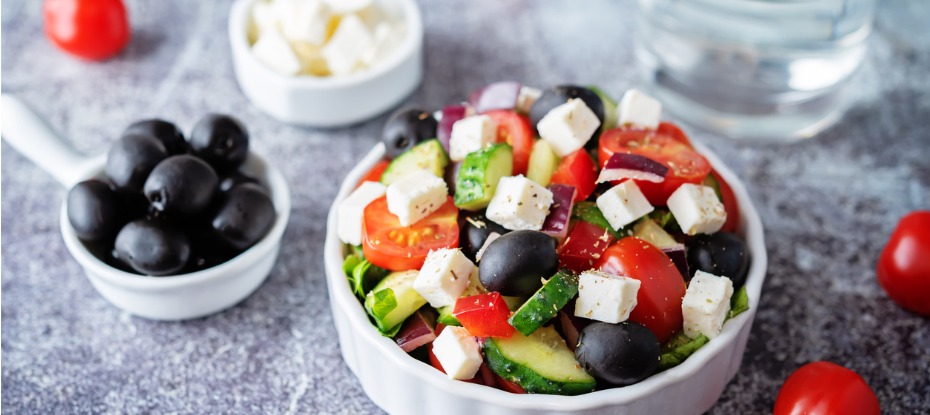
The Mediterranean diet has long been heralded as one of the healthiest. Communities with the most centenarians for every 100,000 people eat a Mediterranean diet. Continue reading to find out how adopting a Mediterranean diet could offer you health benefits and a longer lifespan.
How a Mediterranean Diet Can Improve Eating Habits
A Mediterranean diet is mainly plant-based and includes whole grains, fruit, vegetables, beans, legumes, nuts, herbs, spices, and olive oil. The preferred animal protein is fish and other seafood.
The diet encourages eating healthy fats with olive oil, as the main source of fat, instead of butter and margarine. Other healthy fats include avocados, nuts, and oily fish.
The general recommendation includes eating fish at least twice per week and adding eggs and dairy in small portions daily or a few times per week as additional protein sources. Red meat is limited to a few times per month.
Water should be the main drink daily, but red wine with a main meal may also be part of a healthy diet.
Following a Mediterranean diet means limiting the intake of processed foods, red meat, and refined bread and sugar. Studies have shown that eating these foods in large quantities has been linked to heart disease, type 2 diabetes, and stroke.
This diet has been one of the most successful when it comes to weight loss in over 6 years, most probably due to its satiety benefits and the likelihood of participants adhering to it long-term.
Benefits of Eating a Mediterranean Diet
Many studies conducted over the years have proved the benefits of a Mediterranean diet.
Longevity
A Norwegian study examined causes of death, prevalence of 369 diseases and injuries, and 87 risk factors in over 204 countries and territories. Using this information, they created a predictive model that calculates a person’s lifespan based on their diet. They compared a standard American diet with a Mediterranean diet. The model showed that the increase in life expectancy when a Mediterranean diet was adopted at age 20 was of 13 years for males and 10.7 years for females. Nevertheless, the benefits can still be seen if you are well past 20 years old. The best time to adopt a Mediterranean diet might have been when you were 20, but it’s never too late! Researchers found that if you start eating a Mediterranean diet at age 60, men can expect to live 8.8 years longer and women another 8 years.
Reduced Stress & Inflammation
Stress increases cortisol levels which increases inflammatory blood markers. The inflammation leads to oxidative damage from free radicals, hormone imbalances, a poorly performing immune system, and increases the risk of poor mental health as an adult. A study of adolescents found that following a Mediterranean diet counteracts stress-related inflammation.
Slows Cognitive Decline
Eating a Mediterranean diet can slow age-related memory loss and cognitive decline. A 2021 study of elderly people found this diet was beneficial to people who were already showing signs of memory loss and dementia, as well as those who were not showing any.
Bone Density
The Endocrine Society presented a study that found adhering to a Mediterranean diet was linked to a higher bone density, better bone health, and muscle mass in postmenopausal women.

Mediterranean Foods
A Mediterranean diet is filled with varied sources of healthful foods. As mentioned earlier, fish and other seafood are great sources of protein, but the benefits go beyond being simply good protein sources. These foods are rich in anti-inflammatory omega-3 fatty acids, especially fatty fish such as salmon, anchovies, and mackerel.
Moving onto fats, which play a key role in our body providing heart and satiety benefits, this diet features all sorts of nuts and seeds, giving special attention to avocado and olive oil.
Last on the macronutrient level but definitively not least, carbs - essential for optimal health! These include fruit and vegetables, grains and legumes (which also provide some protein). Aim for variety, and as people say, eat a rainbow by choosing a variety of different-coloured whole foods throughout the day and week.
How Often Should We Eat Mediterranean Foods?
Researchers have suggested that to benefit from a Mediterranean diet, you need to adhere to the diet. Adding in a few foods that feature in the Mediterranean diet won’t offer the same health benefits if you often go back to white bread and red meat (and other processed or refined foods mentioned earlier).
However, the Mediterranean diet is not just about food. Continuing research has shown that the benefits come from a combination of factors including exercise and good social connections that offer immense health benefits.
Other Ways of Improving Your Diet & Lifestyle
You may not want to fully commit to eating a Mediterranean diet but there are still plenty of things you can do to improve your health and potentially your lifespan.
Diet Improvements
Don't Overeat
It’s not just what you eat but also how much you eat. Around 63% of Australian adults are overweight or obese, which is a major contributor to chronic health problems and shortened life expectancy. By cutting back on the volume of food you eat, you’ll be doing your future self a favour. The Mediterranean diet doesn’t specify the amount of food to consume or portion sizes, but it rolls on the important principle of satiety and eating mindfully. A good rule of thumb is to stop eating when you feel 80% full.
Commit to Reducing Your Meat Intake
More people are eating vegetarian, vegan, or simply meat-free meals than before. Many studies show the significant benefits that reducing meat can have on your health, not to mention the positive impact on the environment and the extra dollars you'll have in your pocket.
Don’t Skip Breakfast
Unless you practice fasting (with the help of a practitioner), heading out the door without eating breakfast can set you up for poor food choices. Nutritious food is essential to keep you going, and because we all need fuel to function, you may be more likely to snack on whatever you find on the go. Fill up on a nutritious breakfast, have proper meals, and if you are hungry throughout the day, choose protein-rich snacks for a longer sense of satiety.
Keep a Food Diary
Most of us may think our diet is not "too bad", but it’s not until we write down everything that we’re eating throughout the day that we realise plenty of unhealthy foods may be slipping into our diet. Keeping a food diary can be a useful tool to get back on track with your diet and quickly identify what areas you can improve. If you get anxious or stressed when tracking your food intake, make sure you talk to a specialist. This may be a sign of an unhealthy relationship with food and can be dangerous if left unattended.

Lifestyle Factors
Researchers have found that the Blue Zones (where people live the longest and are healthiest) enjoy a range of lifestyle factors that contribute to their long lifespan.
Low stress
People in blue zones have a strong sense of purpose in life and daily rituals, and value family, faith, and community, which reduce stress and reverse the inflammation associated with stress.
Strong sense of community
Daily socialising is a common trait of blue zone residents. Catching up with friends, family, or people of faith regularly mitigates feelings of loneliness and depression.
Exercise
In Okinawa, Japan, one Blue Zone, dance is a common activity that residents enjoy throughout their life. In other Blue Zones, residents get daily physical activity by working in their vegetable gardens.
Good weather
Many of the world’s blue zones are situated in temperatured climates. This allows people to get out and exercise in ideal conditions, get vitamin D from the sun and be more social than people living in cooler climates. Whenever the sun is shining, go outside and enjoy some vitamin D safely.
Diet Isn’t a One Size Fits All
It’s important to remember that one diet won’t suit everyone. Get informed, try recommendations, and modify eating plans to suit you and your requirements. Sticking to a strict “diet” long-term is unrealistic most of the time. The end result can be yo-yo dieting which can lead to other unhealthy consequences. Instead, aim at making slow progress and creating habits that you can stick to. Feel the benefits and remember these on those harder days.
If you're unsure whether a Mediterranean diet is the right option for you or unsure about how to adopt this way of eating, it always helps to speak with a dietician. Certain extras policies will cover your visit to a dietician through HIF, though you may also like to speak with your GP before locking it in.